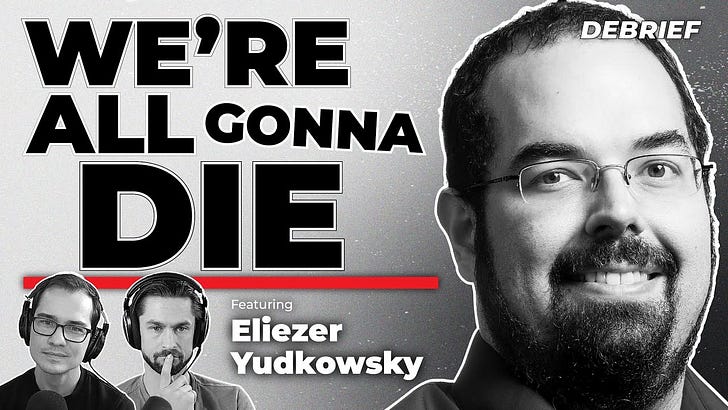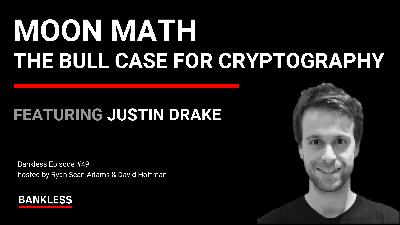🎙Early Access: Crypto-Dollars, Regulation, and DeFi | Jeremy Allaire
Description
A discussion with Circle CEO and USDC Founder Jeremy Allaire in which we discuss Cryptoeconomics, Regulation, and the Future of DeFi.
You have early access to this episode and a copy of the transcript as a full Bankless Member.
Listen in Podcast App | iTunes | Spotify | YouTube (video coming soon) | RSS Feed
Tools from our sponsors to go bankless:
⭐️ AAVE - BORROW OR LEND YOUR ASSETShttps://bankless.cc/aave
🚀 GEMINI - MOST TRUSTED EXCHANGE AND ONRAMPhttps://bankless.cc/go-gemini
💳 MONOLITH - GET THE HOLY GRAIL OF BANKLESS VISA CARDShttps://bankless.cc/monolith
📱DHARMA | MOBILE ONRAMP DIRECTLY INTO DEFIhttps://bankless.cc/dharma
50 - Crypto-Dollars, Regulation, and DeFi
Guest: Jeremy Allaire
Jeremy Allaire is a serial entrepreneur and the Co-founder and CEO of Circle, the firm behind USDC. He advocates for the U.S. crypto industry in Washington, paving the way for current and future regulation of cryptoassets.
USDC and other stablecoins saw a massive influx throughout 2020 into Ethereum and DeFi as demand skyrocketed, providing a glimpse of possible long-term impacts on the future of money. Jeremy argues for a full-reserve money system based on Austrian Economics, moving away from the money creation inherent to today's fractional-reserve systems.
Jeremy details the synergy between fiat stablecoins and non-sovereign, store-of-value, commodity assets. He envisions a future of synthetic digital currencies balanced by a basket of non-sovereign assets.
This is a vital time for instituting effective regulatory measures for cryptoassets and protocols, and as a front-line advocate, Jeremy stresses the importance of the crypto industry itself taking the initiative to front-run regulatory issues via creative innovation. Jeremy self-describes as "cautiously optimistic" about establishing meaningful dialogue with regulators like Gary Gensler, Janet Yellen, and FinCen, focusing on specific issues like criminal abuse, self-sovereign identity, and consumer protection.
Jeremy concludes with broad market predictions and analysis of DeFi as a massively underrated space, with the long-term goal of DeFi interacting broadly with real-world identities.
This was an extremely interesting conversation that shed some much-needed light on stablecoins in a regulatory context, and Jeremy remains a key component throughout this development.
Resources:
Transcript
Ryan
Alright, perfect. Bankless Nation, welcome. We are here with Jeremy Allaire. He is a serial entrepreneur. He's the co-founder of Circle. He is also the king of stablecoins in a way. He's definitely an advocate for the US crypto industry in Washington, DC. Jeremy, it's fantastic to have you on the podcast. How are you doing, sir?
Jeremy Allaire
I'm great. Thanks, Ryan and David, really awesome to be here with you guys.
Ryan
Yeah. Okay. So can we start with this question? Nomenclature-wise, is it stablecoin or crypto dollar? What do you prefer?
Jeremy Allaire
You know, it's really funny, when we started working on this we sort of called these fiat tokens. But that obviously was like what they were. And then sort of "stablecoin" became what people started referring to these as, and you know, I think now basically people call this stuff stablecoins in the broader sector, like if it's in policy or, you know, financial institutions, big fintechs. In crypto, obviously, stablecoin is pretty well known. I like crypto dollar as well. But I think USDC is both a stablecoin and a crypto dollar. But there are going to be stablecoins that are not crypto dollars. And so I think the category is still stable coin ...
Ryan
I like this. Okay, so what is the distinction? What is the difference between stablecoin versus stable dollar?
Jeremy Allaire
Well, I mean, you could have a euro stablecoin, or you could have the yen stablecoin or a Singapore dollar stablecoin, and those are not crypto dollars, because they're not.
David Hoffman
And then also, we should not fit into the category of crypto dollar the Dai, right, because it's not $1.
Jeremy Allaire
Right. I mean, that is a sort of this kind of collateralized, you know, instrument, it's a little bit different. I mean, we're getting into semantics, obviously, they're on a spectrum, there's different ways of working with this stuff. Okay.
Ryan
Let's start this by talking a little bit about last year, 2020. It was really like the year of crypto dollars, it was the year of stablecoins. We want to get into USDC and the role that it played. I have kind of a question before we get into all of that to you, which is I'm not sure it's totally clear for our listeners or for myself, what is the relationship between Circle and Coinbase with respect to USDC? Because sometimes you kind of hear about Circle and USDC. Other times you hear about kind of Coinbase and USDC. Can you tell us about that relationship? Does one of you own USDC versus the other? Do you both issue? How does it work?
Jeremy Allaire
Yeah, so just a little bit of history here. We've been, Circle, very interested in models for how you can kind of represent fiat currency as digital currency. And we've experimented with different ways of approaching that over the years. And then in 2017, we made a decision to kind of work on what we thought of as like a protocol layer for fiat tokens, and with US dollar tokens being the starting point for that. But really importantly, when we thought about it we really believed and obviously continue to believe that the right long term approach for something like this is to have a governed standard, and to really build a governance model around it. And there's a lot of analogies to other things that are standards on the internet, whether it's, you know, the World Wide Web Consortium and the standards around the web, or the IETF, and standards around different protocols that exist on the internet. But in particular with fiat protocols, and the kinds of things that you build around them, you don't just want that to be from a company, you really want it to be something that can be, you know, multiple issuers, multiple companies, multiple geographies, and actually have a governance process around it. So we created something called CENTRE. And Coinbase joined us in the founding of CENTRE and basically from the fall of 2018 until, you know, today, Circle and Coinbase both manage CENTRE Consortium. And we can talk more about that in a little bit because it's growing independently of either Circle or Coinbase. And there's a new, I think, incredibly strong CEO that is going to be building out that consortium in a very significant way, with a lot of different types of firms getting involved. I think Circle and Coinbase together saw an opportunity to build a standard and governance standard that could work as a high quality kind of trusted, you know, dollar market infrastructure in the crypto economy. Technically, you know, Circle operates as what's called the minting issuer of USDC. And Coinbase operates as what is called an issuer of USDC. And we have, we kind of jointly govern the evolution of the smart contracts, the open source project, we all contribute source code to that implementation so that we make decisions together about where that standard goes. There's other policies, like the governance of the reserve model, the compliance and regulatory model, all those things we do together. So that's something that has been a really, really close partnership between circle and Coinbase over the years.
David Hoffman
What would you say would be the advantage of the dividing up of responsibilities of USDC? And is that how you would can kind of characterize it?
Jeremy Allaire
It's not so much a dividing up of responsibilities. Meaning, there are a lot of pieces to this, I think the first is that, you know, stablecoins are regulated as like a stored value, electronic money technology and payment technology in the United States. And that's increasingly how they're being regulated in other parts of the world. And in that model, there is sort of, you know, a company that is doing the issuing of that money, if you will, and has the fiduciary responsibility to manage the reserves and is ultimately on the hook as the licensed and regulated entity that is doing that. Now, on top of that you can build all kinds of different arrangements around the technology standards and around distribution. And that's what CENTRE really established. But I think the best way to think about this, and the way





















